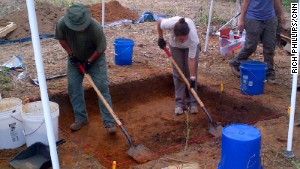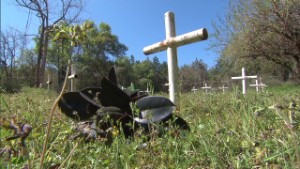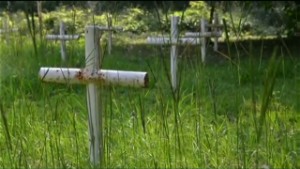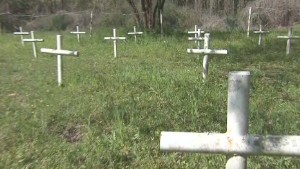Boy missing since 1940 ID'd at shuttered Florida boys school

Boy missing since 1940 ID'd at shuttered Florida boys school
- George Owen Smith went missing in 1940 after being sent to Florida boys school
- After bodies exhumed from site, Ovell Krell learns that one is long-lost brother
- Dozier School for Boys closed in 2011 after ex-students reported decades of abuse
- Krell says even at age 12 she never believed claims her brother died of pneumonia
(CNN) -- On their deathbeds her father's in the 1960s and her mother's in the 1980s Ovell Krell's parents made her promise she'd never stop looking for her brother.
"Will you find Owen and bring him back?" she recalls her dad asking.
"I'll try until the day I die, Daddy," she replied.
After more than seven decades, the 85-year-old has found Owen. She hopes to soon lay him to rest at the Auburndale, Florida, cemetery where her parents are buried.
 Digging up answers to a 50 year mystery
Digging up answers to a 50 year mystery  Florida to exhume bodies at former school
Florida to exhume bodies at former school  Unmarked graves at school to be exhumed
Unmarked graves at school to be exhumed  Boys' graves might hold answers
Boys' graves might hold answers Her mom, after all, instructed her, "Put him with me and daddy."
George Owen Smith was sent at age 14 to the Florida Industrial School for Boys in 1940 for car theft. Krell never saw him again, and her family was told he died of pneumonia after running away from the school and hiding under a house in town.
The school, located in Marianna, about 65 miles west of Tallahassee, is now known as Arthur G. Dozier School for Boys. When it closed in 2011 for budgetary reasons, it capped a chilling, 111-year legacy of brutality.
The dig
Aware of the school's history, Erin Kimmerle, a University of South Florida forensic anthropologist, led a team in 2012 that unearthed remains on the former campus . That bodies lay there was no secret -- 31 rusty, white crosses marked the resting places of victims who died from a dormitory fire, influenza, pneumonia and other causes -- but Kimmerle's team found 55 bodies on the 1,400-acre property.
Owen's body, the team found out last month, was the first to be pulled out of the ground. The university announced the finding Thursday.
"We hope it's the first of many identifications to come," Kimmerle said.
After sending DNA samples to the University of North Texas' Health Science Center, Kimmerle got a call July 25, telling her that one of the samples was a positive match for Krell, who, like other family members, had provided reference samples to researchers.
Kimmerle, who was chief forensic anthropologist for the U.N. International Criminal Tribunal for the former Yugoslavia and has worked to excavate mass graves all over the world, including in Nigeria and Peru, was elated.
"Two years ago, (Krell) was inspirational to us to get involved and do this work. To find her brother and to find him first, we were all a little bit in shock," she said.
She drove to Lakeland with officers from the Hillsborough Sheriff's Department to tell Krell in person -- out of respect, but also because she didn't want Krell to be alone when she got the news.
"It was a total and complete surprise. It shocked me totally numb for a moment. I couldn't say a word. I just looked at her," Krell said. "This, to me, is a miracle because when I think of all the boys and all the graves -- I know they sent 55 remains to be tested, and I'm the only one where they found a match?"
Unfortunately, researchers still don't know how Owen died. It's unclear whether the medical examiner will be able to determine a cause of death, Kimmerle said, and Florida's District 14 medical examiner Michael Hunter did not return a call seeking comment.
Krell said she can't muster enough kind words for Kimmerle and her team -- "Through cold and hot weather, they kept digging away" -- but Krell's persistence shouldn't be discounted.
Dogged pursuit of the truth
Years ago, Krell became worried that her brother's story might go to the grave with her, so she thought, "I've got to write all this down while it's in my mind."
Ovell Krell
She jotted down what she knew and sent it to the governor, media, FBI, the Florida Department of Law Enforcement, anyone she thought might be able to help find out what happened to Owen.
The St. Petersburg Times produced a 2009 special report, "For their own good," and the FDLE opened a 2008 investigation at the behest of then-Gov. Charlie Crist.
Though ex-students provided detailed accounts of vicious beatings, sexual abuse and disappearances (Kimmerle's team found records indicating 22 boys who died at the school weren't accounted for), guards and administrators who are still alive denied the beatings .
The FDLE concluded there was insufficient evidence of physical or sexual abuse or that anyone died as a result of a criminal act.
"I really had begun to give up hope that they'd ever find him," Krell said.
At age 12, Krell thought the stories about her brother were baloney. Even his arrest seemed fishy. Car theft? Owen was 14 and had never been behind the wheel of a car. Automatic transmissions weren't as prevalent in those days. You had to know how to work a clutch and shift gears.
Despite coming from a loving but poor family, Owen ran away more than once. He always wanted to play in Nashville's "Grand Ole Opry." His passion was guitar, but "he could walk into any music store and play any instrument" without taking a single lesson, Krell said.
Krell suspects he was en route to Tennessee when he was arrested in Tavares, Florida, with a 19-year-old man.
"Owen had the wanderlust because he had so much in his body to give, and he just wanted to go out there and give it," she said. "He had God-given talent coming out of the pores of his skin. ... I never understood why God let him be born with that talent and let him be taken away like that."'
'I got what was coming to me'
Owen ran away a few weeks after arriving at the Florida Industrial School for Boys. He was quickly apprehended and wrote home to tell his family about it.
Krell remembers one chilling sentence in the letter: "I got what was coming to me."
"Those were the most ominous words," she said. "After that letter, we never heard from him again."
Her mother wrote the school, inquiring as to his whereabouts. She was told he'd run away again.
"So far we have been unable to get any information concerning his whereabouts. We will be glad to get in touch with you just as soon as we are able to locate George, and in the meantime, we will appreciate your notifying us immediately if you receive any word from or concerning him," Superintendent Millard Davidson wrote in January 1941.
Her mother wrote the school and said she would be traveling to Marianna, a five-hour drive today, "and she would not leave until she knew what happened," Krell recalled.
Ovell Krell
"Four months he was missing before my mother threatened to start investigating, and the day before she arrives, they very mysteriously find his body under a house, totally-and-completely-beyond-recognition decomposed."
School officials told the family they'd found Owen under a house in Marianna, where he'd caught pneumonia and died. Nonsense, a younger Krell thought.
"What 14-year-old boy would lay under there, get pneumonia and not come out?"
And why would Owen stay in Marianna after escaping the school? Wouldn't he want to get as far away as possible?
Also, her brother was terrified of the dark. Krell wasn't -- "I've never been scared of the devil himself" -- and her brother knew it, so when the two came back from errands or the theater as night fell, Owen would clutch the hand of his little sister, two years his minor, to calm his own fears.
"They told us he crawled under a dark house to die. ... This is a stupid story to tell," she said. "It was all a bunch of lies."
A blessing to be shot?
One of the students at the school would later tell Krell he was with Owen when he ran away from the school a second time. The two were caught, the former student told her, and Owen took off running, three men firing rifles at him as he scampered across an open field.
"If they shot him and killed him that night, I'd consider it a blessing because I know now what they did to him if they got him back to that school alive," she said.
Though the state investigation said there insufficient evidence of abuse , dozens of men, many of them now senior citizens, have come forward with their stories. A support group for ex-students, dubbed The White House Boys, takes its moniker from the structure where boys say they were taken to be beaten with a leather strap attached to a wooden handle.
The White House Boys say they were whipped until their underwear was embedded in their buttocks. Some were beaten unconscious. Crying or screaming out would earn you extra lashes, they say.
"The more I learned, the more I knew his death didn't happen under that house. It just didn't," Krell said.
The mystery surrounding Owen's death -- and the fact his family never received his body; school officials said he'd been buried on campus -- robbed the family of any closure.
Krell's mother would stay up till midnight at times, listening for Owen whistling as he walked down the road. Decades after his death, when Krell and her mother saw a country music singer named George Owens on TV, they thought, "Could it be?"
They investigated. It wasn't.
Ovell Krell
"Was he really dead or was he out there wandering around, afraid to come home?" Krell couldn't help but think, "One day, I'll have a knock at the door." It never came.
" Everyone ought to be ashamed"
Owens' death may have guided Krell into a career in law enforcement. She spent 23 years as a Lakeland police officer, and she often spent her free time in the detectives' bureau and forensic department studying things like decomposition times in different weather conditions.
She had a chance to go into forensics. She was even invited to the FBI school, a six-week program. She never pursued it because she had to care for her quadriplegic husband and three children, but her time in law enforcement reinforced one thing: Owen didn't die under a house.
She parses no words discussing the "piss-poor" state investigation that never brought an investigator to her door and that flew in the face of a century-long paper trail of barbarous discipline (a 1903 report stated boys were kept in leg irons, while a 1911 report said the boys were "brutally punished" with a leather strap, according to the St. Petersburg Times special report ).
"The town of Marianna, they ought to be ashamed. Everyone ought to be ashamed, the whole state of Florida," Krell said.
Though she's overjoyed at the prospect of giving Owen a proper burial after 74 years, it's bittersweet. The week after Owen was identified, she lost her brother, Carlton, 70, after a long battle with illness.
Krell will look on the bright side, she said.
"Maybe this is better. Now, we can get both of them laid to rest, and we can relax," she said.
Despite losing Carlton, she's still buoyed by fulfilling her parents' dying wish, and she believes in her heart that they'll be smiling down on her when Owen is placed in the ground between them.
"I wanted so bad to do what I promised my parents," she said. "I can't help but believe it in my soul: I believe my mom and dad are going to know about that. ... They always were proud."


